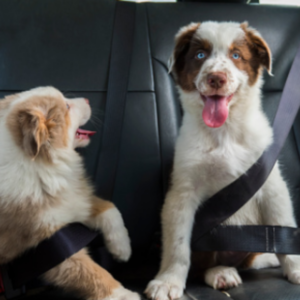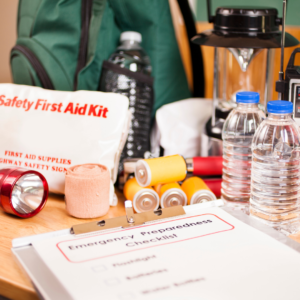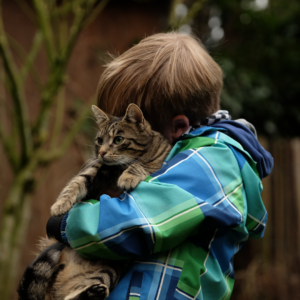By: Humane Pennsylvania Community Outreach Programs Manager, Alexandra Young
In 2005, I spent several months in Louisiana doing animal rescue and recovery work after Hurricane Katrina. Of the 250+ cats in our care at the Alley Cat Allies base camp in Bogalusa, LA during that time, only 11 pets were reunited with their owners. Although some progress has been made since then, human evacuation shelters do not automatically accept pets in the same areas where their owners are living (called co-sheltering).
In 2010, as a direct response to the outcomes of Hurricane Katrina, the Federal Emergency Management Agency’s (FEMA) Citizen Corps declared May 8 as the National Animal Disaster Preparedness Day to raise awareness and encourage pet owners to actively plan for their pets’ safety long before a disaster strikes.
Why Being Prepared Is Important
Some thoughtful planning and a little research will go a long way when you find yourself and your beloved pets in an unexpected situation.
 In our area of Pennsylvania, we don’t have to worry too much about natural disasters like hurricanes and tornadoes. However, severe weather here can easily lead to flooding. And no matter where you live, you can be affected by a local water main break or power outages due to high winds and ice storms.
In our area of Pennsylvania, we don’t have to worry too much about natural disasters like hurricanes and tornadoes. However, severe weather here can easily lead to flooding. And no matter where you live, you can be affected by a local water main break or power outages due to high winds and ice storms.
A more common scenario, and one that’s often overlooked, includes auto accidents. Dogs can easily be thrown from vehicles — especially if they’re smaller, sitting on your lap, or near an open window. A crate secured with a seatbelt is generally considered the safest method to transport a dog.
New safety products are always emerging, although few pet seatbelts/harnesses are actually crash tested. However, there are some products that have been independently reviewed that may increase the chances of your dog surviving a car accident. [1] [2]
Remember: Your pet will observe your behavior and mirror your energy — especially during an unusual, chaotic situation. The key to calmness is advanced preparation: Envision the difference between trying to corral your loose dog with…your bare hands, or maybe a belt, versus clipping a sturdy leash to his well-fitting collar! Taking the following steps now can significantly reduce everyone’s stress later, regardless of the scale of “disaster”.
How To Get Prepared
Get Ready
- Pack a “go” bag of your pet’s essentials: medications, food and water for several days, extra collars,
 leashes, and/or harnesses, and a favorite toy/scent article. Pack a duplicate bag to keep in the car if you travel often with your pet, and be sure to rotate medications so they stay fresh.
leashes, and/or harnesses, and a favorite toy/scent article. Pack a duplicate bag to keep in the car if you travel often with your pet, and be sure to rotate medications so they stay fresh. - Consider investing in a solar-powered battery pack for your phone, water treatment tablets, and a solar-powered weather/emergency radio. Pack these in your personal “go” bag with other human essentials.
- Regularly incorporate positive association tasks with your pet so traveling and confinement (crates and carriers) are normal places for treats, toys, and relaxation.
- Create a first aid kit that covers basic needs for both you and your pet in case of minor cuts, scrapes, insect bites, or other minor injuries. Large towels make great slings and can act as padding or absorbent material.
Be Current
- Keep your pet’s vaccinations and microchip registration updated in case you need to board them or stay at a pet-friendly hotel. Pandemic schedules are still causing longer wait times for veterinary appointments, so don’t wait!
- Ensure your vet’s records are easily accessible, both on your phone and as hard copies in your vehicle. Use a PVC pipe with threaded end caps to store hard copies that show yours and your pet’s veterinarian’s contact information, along with your pet’s most recent vaccination history and medical conditions.
- Keep digital and hard copies of current photos of you with your pet in case you get separated. It’s especially important to show multiple views of markings on cats.
Stay Informed
- Keep a list of local boarding kennels (preferably with veterinarians on-site), pet-friendly hotels, and the local animal shelter if they offer emergency services.
- Research your county’s disaster response agencies and keep their contact information handy.
- Confirm if any local agencies offer co-sheltering options during disaster evacuations.
Extend Your Family
- Identify one or two trusted people who can access and care for your pet in case you are separated, injured, or otherwise unable to do so.
Humane Pennsylvania Maintains Disaster Preparedness
 Humane Pennsylvania is home to the Berks County Animal Response Team (CART), which works directly with the Pennsylvania State Animal Response Team (PSART) and serves as the primary Eastern Pennsylvania large-scale emergency distribution resource for pet food and supplies. We are gearing up to deploy emergency supplies for up to 1,500 animals.
Humane Pennsylvania is home to the Berks County Animal Response Team (CART), which works directly with the Pennsylvania State Animal Response Team (PSART) and serves as the primary Eastern Pennsylvania large-scale emergency distribution resource for pet food and supplies. We are gearing up to deploy emergency supplies for up to 1,500 animals.
We attend ongoing training with the Berks County Department of Emergency Services and coordinate with numerous other county agencies to prepare for a variety of disasters, including chemical spills, radiation contamination, and severe weather damage.
Our organization also supports families and their pets by offering temporary foster housing for needy pets in emergencies. PeNet has been recognized by Harvard’s John F. Kennedy School of Government as a “Government Innovation” program. Find more information on both of these programs and much more at humanepa.org.
[1] https://www.whole-dog-journal.com/care/collars-harnesses-leashes-muzzles/dog-car-harnesses-review/
[2] https://www.whole-dog-journal.com/lifestyle/small-dog-car-safety/

